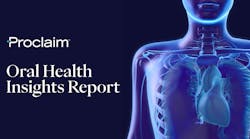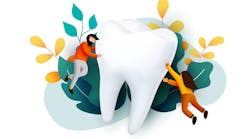Western Dental expert says good health begins with a great smile
ORANGE, Calif. -- You've heard the advice before: Brush your teeth, eat right ,and see your dentist regularly. Yet as we age, those basics may get brushed aside as other health concerns demand attention. That can put seniors at risk of developing more serious health issues, says Dr. Louis Amendola, Chief Dental Director of Western Dental Services, Inc.
"As we learn more about the aging process, it's becoming clear that good dental care has a big effect on overall health," says Dr. Amendola. Inadequate dental care initially may accelerate tooth decay and gum sensitivity. Over time, however, poor oral health can contribute to more complex health issues, including cardiovascular disease, diabetes, and malnutrition, says Dr. Amendola, who oversees 750 dentists in Western Dental's 250 offices in California, Arizona, and Nevada.
To keep smiles healthy and to stay physically healthy, seniors should be aware of these potential dental issues:
Mind the Medicine: "Some common medications are likely to cause decreased saliva flow," says Dr. Amendola. "Diuretics and medications to control blood pressure, allergies, and asthma can cause a dry mouth, as can drugs to aid seizures or mental illnesses."
A chronically dry mouth (called xerostomia) can cause problems with speaking, tasting, chewing, and swallowing. Aside from being uncomfortable, a dry mouth creates an environment that increases the risk of cavities, bad breath, and gum disease.
To tame the effects of a dry mouth, drink more water, and avoid tobacco, alcohol, sweets, and caffeine. In addition, commercially available products can help stimulate saliva flow. If you are taking medications that dry your mouth, see your dentist more often. Your dentist can prescribe fluoride and other products to slow or reverse the damaging effects of dry mouth.
Eat, drink, and be healthy: Oral pain that makes eating or drinking unpleasant can lead to a decreased appetite and, if left untreated, malnutrition. Inadequate nutrition can cause fatigue, depression, muscle weakness, and a debilitated immune system that's unable to fight off infections.
"If you or a loved one have oral pain, don't delay," Dr. Amendola says. "See a dentist right away before your dental issue becomes a bigger health issue."
Get handy tools: Further, patients with arthritis or other conditions may have difficulty holding a manual toothbrush long enough to get teeth clean. Dr. Amendola encourages trading up to a battery-operated or rechargeable toothbrush to do the fine detail work and speed the job. With most mechanical toothbrushes, you need only to "paint" the surfaces of the teeth, while the toothbrush does all of the scrubbing and cleaning. Many models also have a large handle that's easy to grasp. The typically small heads on rotary toothbrushes are often easier to move into hard-to-reach areas.
Also, arthritic fingers may be unable to control dental floss adequately. Dr. Amendola suggests switching to a pre-threaded floss pick or floss made to slide more easily between teeth.
Visit twice a year: Western Dental and Dr. Amendola recommend visiting the dentist every six months for a checkup and cleaning. Regular checkups can help keep teeth -- and bodies -- healthy. For example, every Western Dental exam includes a simple screening for oral cancer. Cancers of the mouth are more likely to affect us as we age, often because of longer exposure to risk factors such as tobacco and alcohol use. Frequent examinations allow dentists the opportunity to identify potential health issues before they become serious.
For more information about finding a nearby dentist, visit www.westerndental.com.
To learn more about Western Dental, visit tinyurl.com/668stjg.
To comment on this article, go to community.pennwelldentalgroup.com/.

